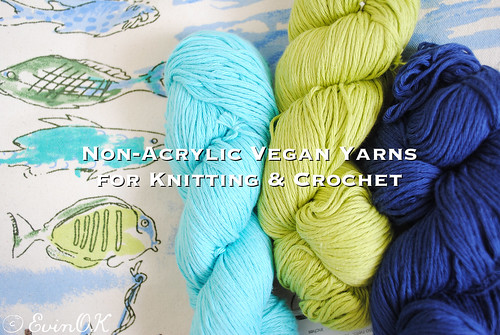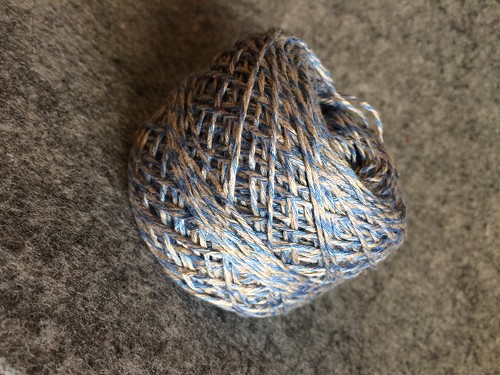If you’re here, you want to seek out vegan yarn for your crafting or a gift. Sourcing vegan yarn has become simpler in recent years with animal fibre allergies and ethical approaches to animal welfare. But when I looked for a master list, I could not find one. I am certain one exists, but perhaps its SEO is lacking. In any case, I search on Ravelry for fibre content and am listing some readily-available non-acrylic vegan yarns for knitting and crochet. If you know of others, add them in the comments! You can follow along on my knitting designing, baking, and life’s adventures on my Instagram account.
A List of Vegan Yarns
Vegan-friendly yarn is a yarn that is made from non-animal fibre sources. This means absolutely no wool, silk, alpaca, mohair, angora, and so on. But some vegans are mindful of the environment too, so this list will focus on vegan-friendly yarns because these specifically have a lower environmental impact. Such as how acrylic clothing fibres contribute to the microplastics in our oceans. What you’ll find here is a list focused on plant-based yarn materials, such as bamboo, cotton, kapok, hemp, linen, corn, soy, banana fibre silk, tencel, viscose, and aloo/nettle. Ideally, you want to source organic cotton which is more sustainable and minimize acrylic yarn elements.
Heidifeathers® Needle Felting Vegan Kit
100% Bamboo
Darn Good Yarn Banana Silk, Chunky
banana fiber
Blue Sky Fibers Organic Cotton, Worsted
100% Cotton
Blue Sky Alpacas Organic Cotton Yarn
100% Cotton
Blue Sky Fibers Organic Cotton Skinny, Sport
100% Cotton
Darn Good Yarn Single Ply Hemp, Sport
100% hemp
Lion Brand Nature’s Choice Organic Cotton, Worsted
100% Organically Grown Cotton
Debbie Bliss Eco Baby
100% Organic, Fair Trade Cotton Yarn
Lion Brand Cotton, Worsted
24/7 Cotton is a worsted-weight, mercerized 100percent natural fiber yarn
elann Go Lightly, Worsted
60% Cotton/ 40% Acrylic
Habu Textiles shosenshi linen paper, fingering/novelty
100% linen
Araucania Alumco Hand Painted, Worsted
50% Viscose, 50% Cotton
Araucania Caña Ruca Hand Painted, DK
100% Viscose
Myboshi, approx DK
15% Kapok, 85% Cotton
Pascuali Mais, approx Sport
100% viscose (from maize cellulose)
Schachenmayr Tahiti, approx Sock/Fingering/Sport
99% cotton, 1% polyester
Pascuali Nepal, approx Sport
60% Cotton, 28% Linen, 12% stinging nettle
Pascuali Re-Jeans, DK
100% cotton (contains recycled cotton)
Rowan Summerlite, 4ply
100% Cotton
Pakucho Flamme Twist, Worsted
100% Certified Organic Color Grown Cotton Fair Trade Cotton
Pro Lana Ocean Batic, approx Sport/DK
100% Cotton
Pakucho, Worsted
100% Certified Organic Color Grown Cotton Fair Trade Cotton
Pakucho, Lace (Cream)
100% Certified Organic Color Grown Cotton Fair Trade Cotton
Pakucho, Lace (Dark Green)
100% Certified Organic Color Grown Cotton Fair Trade Cotton
ChunkiChilli Organic Cotton
100% Turkish Cotton
Fettuccini Zpagetti T-Shirt Yarn
92% Cotton and 8% Elastin or Lycra
La Droguerie Bossa Nova, Worsted
50% Cellulose – Bamboo (Bast), 50% Cellulose – Linen / Flax
La Droguerie Bambou, DK
100% Cellulose – Bamboo (Bast)
La Droguerie Kaléido
92% Cellulose – Bamboo (Bast), 8% Cellulose – Linen / Flax
La Droguerie Lin
100% Cellulose – Linen / Flax
Cellulose Fiber for Spinning
100% vegan sustainable, biodegradable, and cruelty-free plant-based fibers
This is a partial list that I will add to as I encounter more options, but you can also look at Etsy for vegan yarn options. Like this handspun undyed banana silk!
Related Articles on Vegan Yarn
I will also link to a few select articles that were carefully researched and written by others on this topic to further your knowledge of the subject. The first two articles are especially informative and well-researched.
Is Your Yarn Sustainable? Eco-friendly Crafting with Josephine Yarns by Conscious Shop Collective
Eco Friendly Yarn by Kathreen Ricketson
How to Make Your Knitting Eco-Friendly by GreenGranny.org
Not Everyone Will Choose to be Vegan, but We Can All Be Ethical
Vegan is not an easy lifestyle, but even if it’s not for you (I’m not vegan myself), you can adopt elements of it. Every step or change is good – every bit makes a difference! Ethically-sourced fibres make a huge impact and guide the future of yarn sources. You can choose wisely in small ways, even if you are not exclusively vegan. What does that mean? It means:
- Read ‘Why sheep shearing is absolutely necessary for sheep welfare‘ from the American Society of Animal Science Board of Directors
- NO MULESING. If you’re against declawing cats or ear cropping or tail docking in dogs, you are against mulesing too even if you don’t know it.
- Avoiding synthetic yarns that are petroleum-based which is not biodegradable and causes damage to our environment.
- Choose organic or small-scale wool farms. Choose wool from farms that do not dip their flock into pesticides and who care for the animals’ welfare.
These Islands
In 2015, I coauthored a book with Sara Breitenfeldt about focusing on local, ethically-reared sheep for sourcing wool. With a focus on Ireland’s own Zwartbles and now-defunct Smudge Wools, we showed readers that wool can be done while still treating the sheep with love and appreciation. You may have read about the book in Irish Country Living (May 2015) or on GoodReads or on my 40 Shades of Life blog. The book, These Islands: Knits from Ireland, Scotland, and Britain, is available from your local bookstore by ordering this ISBN 978-1910567036 or through any number of online retailers, like:
Zwartbles Ireland €12.50
Amazon.com $11
BarnesAndNoble $11
Amazon.co.uk £5.36
BookDepository €6.82
And though silk is not vegan, Tussah silk is harvested from the wild after the silk moth has emerged. No animal harm. But this is limited and know the source to make sure they aren’t misrepresenting. Or opt for reclaimed animal fibres, such as Darn Good Yarn, Worsted reclaimed silk yarn or reclaimed Sari Silk.
So, the discussion of vegan yarn is far from simple. The complexity only lends itself to a worthwhile overall discussion of animal welfare and not take advantage of creatures who cannot speak up for themselves. But there is also a balance since many fibres are plant-based or sourced as a byproduct of the animal existing happily. Like Zwartbles since the sheep must be sheared anyway.
What are your thoughts on this? Do you have a favorite vegan fibre?




Thank you so much for this! It’s a challenge to find ethically sourced fiber. And even if it is plant based, that’s no guarantee that the workers were paid an ethical wage, either 🙁 It’s honestly really challenging!
Anyway, I was wondering what you thought of the environmental impact of the bamboo processing process? Some of the creators of bamboo and other things like Tencel use a closed-loop system, but others do not, and the waste products are just released into ecosystem.
Any thoughts on filtering out ones to look for and ones to avoid?
P.S. I -love- Blue Sky Fibers Organic Cotton. It’s amazing. I can’t say enough good things about this yarn, and was thrilled to see it on your list!
That is a great consideration, Sarah. I debated where to draw the line so many times writing this post. The chemical processing of bamboo is problematic for the environment with not all bamboo sources and processes being properly documented to trace the environmental impact. Or so I learned in researching this. This article was interesting. I wish I knew more. Thanks for reading!
Oooh, thank you for the link! I started following up — it’s very interesting reading!
I am knitting a pair of mittens for a friend on chemotherapy. One of his medications causes his hands to be extremely sensitive to cold, so I am looking for something that is both warm and soft. He is vegan, so wool and angora are definitely out! I had assumed that left me with acrylic and cotton to choose from, but I see your list specifies “non-acrylic”, although one of the yarns is 40% acrylic. What exactly is the concern with acrylics? Are they the petroleum-based synthetics you referred to? Please pardon the ignorant question – I am fairly new to knitting! What vegan yarn would you suggest that would be good for sensitive skin and be easily washable? Thank you in advance!
Hi Gloria, yes, the environmental impact of acrylics has them low on the lost for vegan yarns. But most are vegan. Bamboo may be nice against his skin or a blend with that. I find it to be very soft against the skin and I’ve heard some say it has anti-microbial properties. Hope the gloves go well!
Thank you so much! I didn’t expect a reply for a few days. I’ve used a bamboo blend before and what I remember most is that it was super-slippery and I had to buy wooden needles to keep it from slipping off. That may be because of what else it was blended with. I’ll let you know what I end up choosing.
Can’t wait for your update! Yes, bamboo is slippery. I used a merino-bamboo blend and it was soft and warm but didn’t slide off the needles as much.
I love this list, but it is unlikely that I will buy any of these. I want to go and live off the grid in the high north (above the polar circle) and I will need a decent and cheap alternative for knitting yarn. I can get 240m (100gr) of acrylic yarn for 2,50 euros and I know that there is cheaper yarn on the market! I will perhaps live 80 kms away from the first village which has just a small choice of yarn. Even in the first city, 300 kms away the choice is low and I may not always have the funds in future to buy better yarn. My major concern then is: is it vegan? It is tough enough to live vegan up there!